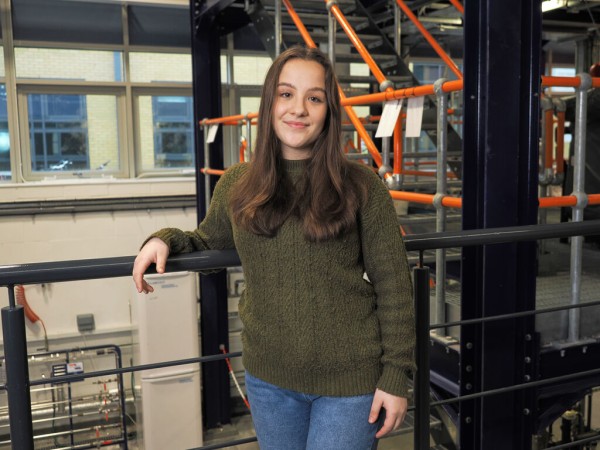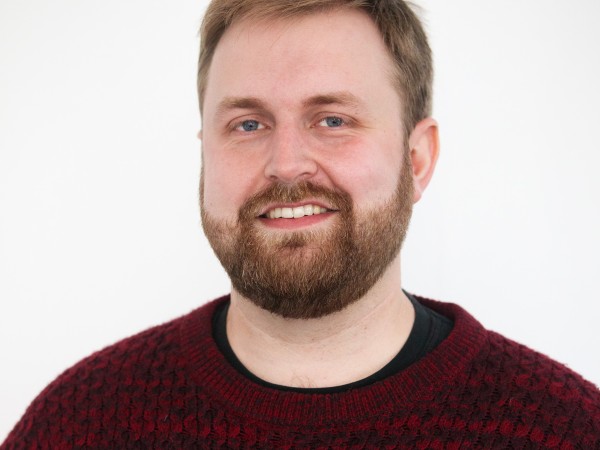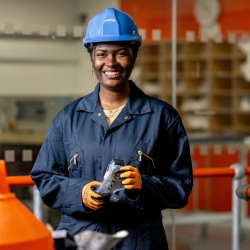
Subomi A.
'Surrey is superb at supporting students through their placement years. I completed my professional training year at Pfizer UK as a Reliability Project Engineer, where I focused on improving energy efficiency, system reliability, and operational performance across the Pilot Plant and Wastewater Treatment areas'
Course
Chemical Engineering MEngPlacement company
Pfizer UKWhat do you like about your course and why?
As with most students who go into chemical engineering, I chose the course because of my love for maths and chemistry. However, what I’ve come to particularly love about chemical engineering is its impact—how it transforms raw materials into everyday products we often take for granted. I initially chose this course because I wanted to make a meaningful impact on people’s health by contributing to the pharmaceutical industry.
When I visited Surrey during an applicant day and toured the pilot plant, that vision became clearer. I could already see how my two favourite subjects would be applied in a pharmaceutical setting—learning about mass balances and reaction engineering needed to produce pharmaceutical-grade saline solution. I was also excited to see how much the university values the industrial training year, which was another major reason I chose Surrey.
Since joining, I’ve realised chemical engineering is so much more than pipes and processes. I’ve explored sustainability in depth which later helped with industrial projects, worked with simulation and programming tools like MATLAB, and learned about safety regulations through modules like Process Safety and Operations Integrity. I’ve also gained insight into the complexity of supply chains—how the chemical industry isn’t necessarily a straight line, but a web of interlinked processes. The course continues to show me how wide-reaching and impactful chemical engineering truly is.
The academics are also incredibly supportive. Special shout out to Aunty Judy Lee, who is always championing students—making sure we feel heard, enjoy the course, and get the support we need.
The lecturers are very approachable and always happy to chat about coursework. I’ve especially appreciated helpful, thoughtful feedback from Dr Daniel Sebastia and Dr Vasanth Kumar—feedback that actually clarifies things rather than leaving you more confused! It really makes a difference when your lecturers are invested in your success.
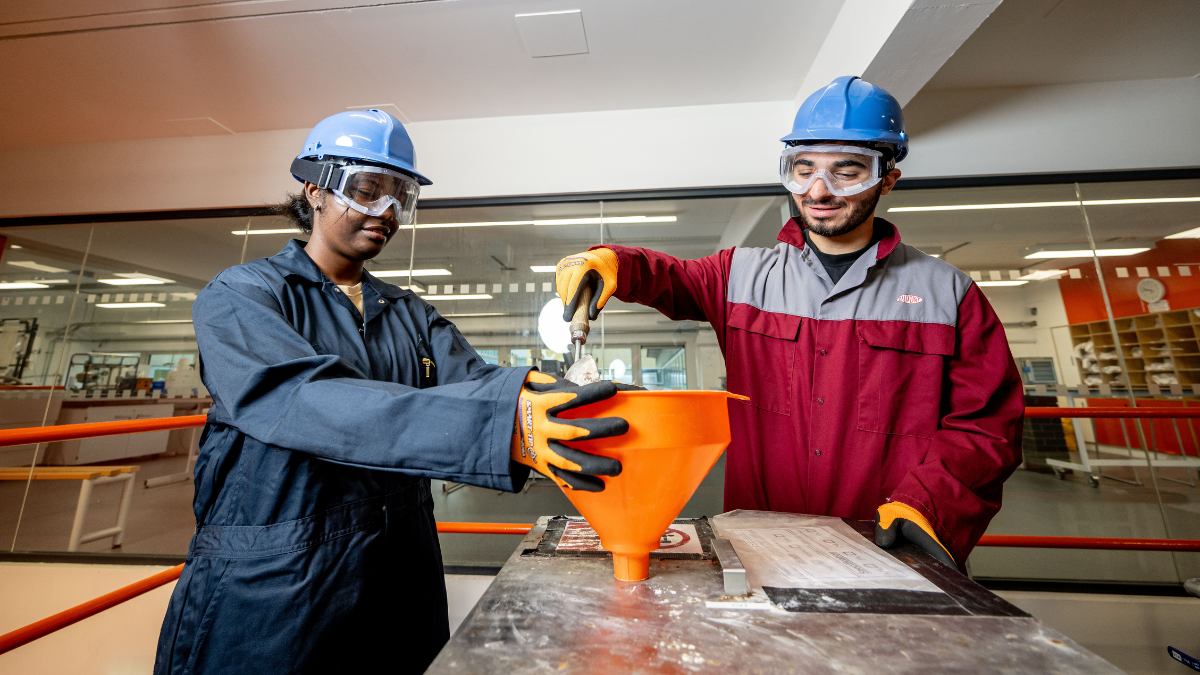
Subomi working hands-on at the pilot plant.
What do you enjoy most about Surrey?
I really love that Surrey is a campus university. It creates a more comfortable and familiar environment, especially if it’s your first time living away from home. City universities can sometimes feel overstimulating—you’re having to adjust to both university life and the fast pace of a city all at once.
At Surrey, both Stag Hill and Manor Park campuses have a calm, welcoming atmosphere that genuinely feels like a safe space.
There were times when I could walk to a friend’s flat around 2am if I was struggling with something or leave the library around that time after trying to get coursework done and not feel unsafe—something that’s rare and reassuring.
Another thing I love is the range of societies. There’s something for everyone, and if there isn’t, you can create your own. At the end of my third year, a group of students launched the Taylor Swift Society, which I later joined as the Wellbeing Champion Officer during my master’s year—a role that allowed me to support others and bring people together around a shared interest.
For night owls, there’s even an on-campus nightclub, which is a fun and safe way to blow off steam during the week. The campus also has plenty of cafes and restaurants with student friendly prices, so you’re not short on places to eat. These cafes and restaurants even hire student staff, which is a great way to earn money and gain experience while studying.
I also really appreciate how aesthetically pleasing and comfortable the study spaces are. Places like The Hive and The Dot/Spark make studying feel less like a strict, office-like task and more like something you can actually enjoy. The atmosphere is relaxed and inspiring, which really helps when you’re trying to stay motivated. For those who are big city kids at heart, Guildford is only a 45-minute train ride away from the centre of London, so you truly get the best of both worlds.
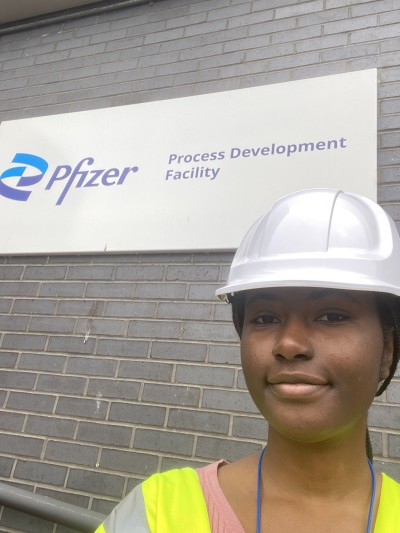
Tell us about your Professional Training Placement
Surrey is superb at supporting students through their placement years. I completed my professional training year at Pfizer UK as a Reliability Project Engineer, where I focused on improving energy efficiency, system reliability, and operational performance across the Pilot Plant and Wastewater Treatment areas. I led low-cost energy-saving projects, helped monitor the site’s utility data, worked on AutoCAD to update P&IDs, and collaborated with contractors and engineers to upgrade equipment.
A highlight was being able to sit in on senior leadership meetings as they worked through the stages to decommission the site and organising STEM outreach events for local schools. I also shadowed process engineers on API manufacturing steps and conducted 3D site scans for virtual training across global sites.
The Chemical Engineering department itself is amazing. Students can grow in their research, lab, and industrial skills through summer placements with academic staff. I completed a summer internship with the Dr Michael Short and Rolls-Royce, where I worked on real-time optimisation of anaerobic digestion.
I modelled biogas and CO₂ yields from food waste feedstocks and developed a CO₂ emissions calculator comparing disposal methods like landfill and incineration. It was a great opportunity to explore sustainability in a practical, data-driven context.
Also, a paid opportunity is open to MEng students to work as Plant Managers, overseeing and training third years on how to operate the pilot plant for their Process Operations and Management (POMs) module. I took on this role in my final year and managed production of varying grades of saline solution, guided students through SOPs and alarm responses, and adjusted parameters for efficiency and quality—all while ensuring safe and smooth operations.
What do you want to do when you graduate?
After graduation, I plan to begin my career in the pharmaceutical industry as a process engineer, with the goal of contributing to the development of sustainable and efficient manufacturing systems. I’m particularly interested in applying my experience in energy efficiency, process optimisation, and quality control to improve large-scale pharmaceutical operations.
Long term, I’m working towards becoming chartered engineer with IChemE, so I’m applying for graduate roles that will support my professional development, whether through structured chartership programmes or by offering opportunities to gain the experience needed for chartered status.
This summer, I’ll be working on campus under the Organisation for the Prohibition of Chemical Weapons (OPCW), helping train industry professionals—primarily from chemistry backgrounds—on how to operate an industrial pilot plant using Surrey’s on-campus facility. It’s a unique opportunity to combine my technical knowledge with training and communication skills, and I’m excited to support global chemical safety and education efforts as part of that role.
Your advice to new students
Come in with an open mind.
Chemical engineering is not just maths, chemistry, and pipes. It’s a broad degree that gives you access to a range of industries including pharmaceuticals, water treatment, food, oil and gas, cosmetics, and energy. If you enjoy solving problems and want to make a real-world impact, this course gives you the tools to do that. It also helps you explore where your strengths and interests really lie.
Even though it’s optional, I highly recommend doing a placement year. It gives you insight into what working in industry is actually like and can help shape your career direction. You might be set on working in the energy sector but realise after a year in industry that your passion lies elsewhere. It also helps you figure out what kind of working environment suits you—some people discover they prefer being onsite and hands-on rather than in an office setting. It’s a valuable opportunity to test your assumptions and grow your confidence before graduating.
Don’t be afraid to talk to your lecturers—they’re approachable, supportive, and want you to succeed. Whether it’s course content or career advice, they’re here for you. Also, maintain a healthy work-life balance. Chemical engineering can be intense and it’s easy to let it take over your life. But university is also about making memories. Join societies, explore new interests, and don’t feel guilty about switching off. Not every conversation needs to be about coursework, even at Rubix!
